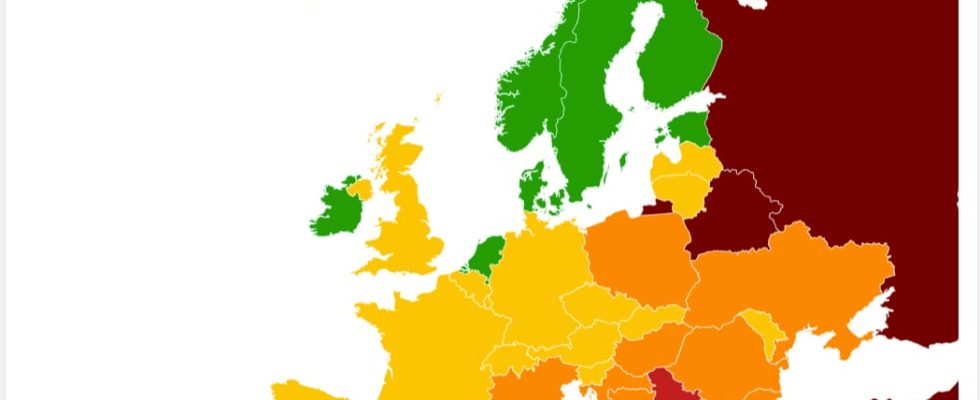“On a global scale, one thing is clear: press freedom is threatened by the very people who should be its guarantors: the political authorities.” For its 2024 press freedom rankings, Reporters Without Borders has chosen to specifically warn of the increasingly serious threats from political regimes to media independence. “Among the five indicators that make up the country score, the political indicator is the one that will decline the most in 2024,” warns the NGO, which observes a “worrying deterioration in support and respect for the autonomy of the media” , and an increase in “pressure exerted by the State or other political actors”.
If the overall state of press freedom is hardly encouraging in many parts of the world, it is in Europe that the situation remains best. Seven of the only eight countries in the situation considered “good” are part of the European Union (the eighth being Norway). However, despite a more than satisfactory general situation in the profession, “the general decline in the political indicator also affects the top three in the ranking (Norway, Denmark and Sweden)”, details Reporters Without Borders. Ireland, which was second in the index last year, moves to eighth position this year, due to “judicial intimidation by political groups targeting the media”
France, for its part, ranks 21st in the world index for this year 2024, three positions gained compared to last year, and five more than two years ago. The situation there is considered “rather good” by RSF, which emphasizes that “press freedom is not threatened by major political attacks.” The NGO nevertheless points to “the arrest of French journalist Ariane Lavrilleux following a complaint from the Ministry of the Armed Forces”, while the 2023 edition had judged that “the tools aimed at fighting against conflicts of interests were insufficient, inappropriate and outdated. Among the other good students, Germany, which entered the top ten of the ranking, saw its situation improve, in particular due to a “relative decline in attacks against journalists perpetrated by small extreme groups RIGHT”.
“The harmful influence of the Kremlin”
However, the European Union is not exempt from all reproach. Two countries in particular, with “dangerous dynamics”, are in RSF’s sights: Viktor Orban’s Hungary and Robert Fico’s Slovakia, accused of seeking to “reduce the playing field of independent journalism”. Georgia Meloni’s Italy also lost five positions in the ranking, now in a “problematic situation” at 46th place. The censorship of an anti-fascist writer on Italian public television, Rai, had particularly caused controversy in recent weeks. Unlike Poland, which since the election of pro-European Prime Minister Donald Tusk, has climbed ten positions in the ranking (47th).
The state of press freedom in these countries nevertheless remains far from what is happening in Eastern Europe and Central Asia, where “the situation has generally deteriorated” and where “harmful political influence of the Kremlin” continues to expand, according to RSF. In many countries in this region, press freedom “is not guaranteed, and the media are increasingly used as transmission belts for disinformation campaigns.”
Russia, in 162nd place (out of 180), is an absolute counter-model, “continuing its crusade against independent journalism, while more than 1,500 journalists have fled abroad since the invasion of Ukraine” . The overall state of press freedom has continued to deteriorate compared to last year, notes RSF, with an ever-longer list of journalists and media outlets labeled as “foreign agents” or undesirable. . Georgia, where the ruling party “cultivates its rapprochement with Moscow and pursues a policy increasingly hostile to press freedom” is one of the examples cited by RSF to illustrate the influence of the Kremlin, with a loss of 26 positions in the ranking (now 103rd).
Russia is not, however, the worst country in the region: Belarus (167th), “whose regime persecutes journalists in the name of the fight against ‘extremism'”, and Turkmenistan (175th) where “the president, with unlimited powers, prohibits all independent information”, are among the worst performers in the world in terms of press freedom. An observation which is still found in Turkey (158th), where the Erdogan regime “continues to imprison journalists and weaken the media through practices of Internet censorship and judicial control”.
Ukraine’s spectacular leap
On the contrary, at 61st position in this ranking, it is Ukraine which constitutes the “surprise”, announces Reporters Without Borders, with 18 places gained compared to last year. A jump which can be explained by “the improvement in security indicators – fewer journalists killed – and political indicators”. If the NGO recognizes that the rule of law cannot be applied throughout the territory since the Russian invasion, “preventing the authorities from guaranteeing freedom of the press”, political interference in free Ukraine ” have decreased. “The fact that the media denounce this type of pressure limits them,” explains RSF.
Finally, a last notable point of this 2024 RSF report is found in the “worrying” and unregulated use of generative AI. “Deepfakes now occupy a leading position in influencing the course of an election” explains the NGO, “as evidenced by the deepfake audio of which journalist Monika Todova was the victim during the legislative elections in Slovakia (29th in the ranking, – 12 places), one of the first documented cases of this type of attack on a journalist with the aim of influencing a democratic election. Yet another threat to press freedom which is already weakened.
